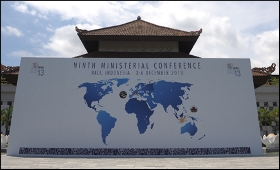|

|
WTO deal to benefit SME exporters
|
|

|
|
| Top Stories |
 |
|
|
|
Bikky Khosla | 10 Dec, 2013
Red tape is a big deterrent to exports, be it of domestic or international origin. While bureaucratic hurdles at domestic level have always remained a big challenge for our exporters, red tape of international origin is no less a worry. Paperwork and administrative hurdles at borders and unnecessary international regulations often result in delays, uncertainty and high transaction costs, and instances abound when hardworking exporters have to suffer massive losses due to such barriers.
But now a lot of things may change in the coming months, with the WTO on Saturday sealing the first global trade pact in its 18-year history -- a "trade facilitation" deal, which is expected to eliminate red tape in global trade to a significant level by streamlining customs procedures, lowering transaction costs and eliminating corruption at ports and border controls. The deal seeks to make global trade faster, easier and cheaper, and if implemented I think the small business community across the world will be the biggest winners since they are the worst suffers under the current system.
According to the International Chamber of Commerce, the deal is expected to give a $1 trillion boost to the global economy, create some 21 million jobs, nearly 18 million in developing nations. Similarly, the OECD Trade Facilitation Indicators estimate that comprehensive implementation of all measures currently being negotiated in the Doha Round would reduce total trade costs by 10 percent in advanced economies and by 13-15.5 percent in developing countries. It adds that reducing global trade costs by 1 percent would increase worldwide income by more than $40 billion. These figures say a lot about the potential of the WTO deal as a global trade booster.
Beyond the numbers, the pact is significant from some other points of view: first, it marks the end of WTO's two decades of ineffectual negotiations and thus ends an increasingly thickening doubt about its relevance; second, it is encouraging to see how the 159 WTO member nations showed a truly international approach and have come together on a common set of trade principles -- the deal will be an inspiration for nations across the world to enter similar multilateral trade pacts; and third, the deal gives indication that negotiations in other areas of the Doha Round are yet not over and still continue.
However, what I find significantly negative is the stand of the rich nations, particularly the US and EU, on the food subsidy issue. They are of the view that developing countries should not be allowed to overshoot their food subsidy cap of 10 percent of national income beyond the first four-year period, but ironically these nations themselves are providers of some big subsidies. According to a report, in 2012 the US gave about $30 billion as subsidies to farmers while the 27-nation EU together gave $107 billion worth of subsidies and China a whopping $166 billion. Such double standards should be avoided.
I invite readers' feedback.
|
|
|
| |
|
|
|
|
|
|
|
SME friendly
H. Banerjee | Fri Dec 13 04:50:49 2013
It is great that the deal will open up the borders from red tape to some extent. I hope faster implementation of the measures. Export import suffer due to red tap and should be removed as much as possible.

Subsidies not good
Francis Chikerema | Wed Dec 11 17:30:58 2013
What the U.S.A.,EU and China are doing by giving subsidies to the developing nations is a bad thing,because it is only helping these developed nations getting richer and keeping the third world poorer and poorer.What is needed in the developing nations,is equipment and meaningful investments.They are using the third world as their hunting grounds.Aid in a form of money is an instrument of disaster in developing countries where small businesses are supposed to be encouraged by relaxing the imports/exports of capital equipment etc.
Rich countries are creating a dependence syndrome in the third world,which is in my mind a very bad thing.they go into a country and do a job,get paid and leave that country,this does not encourage small business to grow and work towards eradicate poverty in those areas at all.African countries are the most hit by these systems in place,the import controls must be eased for these counties to be able to import equipments and export their products may be between themselves or to the developed nations with no controls and protectionism.

|
|
|
|
|
|
|
| |
| Customs Exchange Rates |
| Currency |
Import |
Export |
US Dollar
|
66.20
|
64.50 |
UK Pound
|
87.50
|
84.65 |
Euro
|
78.25
|
75.65 |
| Japanese
Yen |
58.85 |
56.85 |
| As on 13 Aug, 2022 |
|
|
| Daily Poll |
 |
 |
| PM Modi's recent US visit to redefine India-US bilateral relations |
|
|
|
|
|
| Commented Stories |
 |
|
|
|
|
|
| |
|